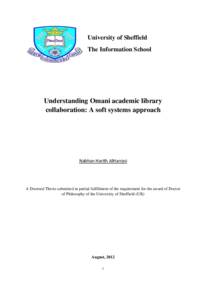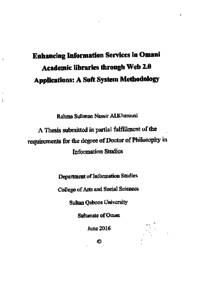وثيقة
Understanding Omani academic library collaboration: a soft systems approach
الناشر
University of Sheffield
ميلادي
2012
اللغة
الأنجليزية
الملخص الإنجليزي
Although academic library collaboration systems are indubitably of great value in terms of, for example, sharing resources and cost-effectiveness, technical, financial, and behavioural constraints must be taken into consideration. This study addresses the challenges and opportunities in the establishment of a collaboration programme among four Omani academic libraries. Conducting an interpretive SSM study of Omani academic library collaboration (OALC) contributed to understanding of the situation and offered a holistic view regarding the needs of participants from a collaboration system, factors which would support or hinder collaboration, and their ideas on improving the current situation of OALC. The study, moreover, modelled the situation of OALC by developing root definitions and conceptual models that reflected different viewpoints of participants. Subsequent discussion with research participants enabled decisions to be made on changes which were systemically feasible and culturally desirable to improve OALC. Finally changes were made to structure, procedures, and attitudes of people based on learning achieved through different processes of this research.
As a result of the intervention process that involved research participants throughout the research, OALC was described as complex and surrounded by many internal and external factors that rendered it problematical. Omani academic libraries were affected by their parent organisations, technology, and limitations of their financial and human resources. However, the desire among the staff to improve communication, coordination and skills enhanced the potential for the successful establishment of a collaboration system. Based on the participants' perspectives, eight systems were suggested to improve OALC, including raising awareness of staff understanding regarding working collaboratively, collaborative training, communication, partnership, identification of collaborative activities, funding, interlibrary lending, and collaborative storage and retrieval. A workshop was then organised to implement the awareness raising system, improve inter-group communication and conflict resolution, establish a strategic planning committee composed of representatives from every library to carry out the activities, and develop some rules and regulations that could be used to operate and control the system of interlibrary loans. The changes achieved through the process of the research would impact on three dimensions of the academic libraries: structure, attitude and procedures.
The learning and reflection of the application of SSM on OALC was reported. SSM was found to constitute an effective tool for facilitating learning in broad social situations such as that of OALC. It became embedded in participants' thinking processes throughout different stages of the methodology and enabled them to implement improvements step by step, taking account of both individual needs and the organisational needs of every participating library
المجموعة
URL المصدر
قالب العنصر
الرسائل والأطروحات الجامعية


